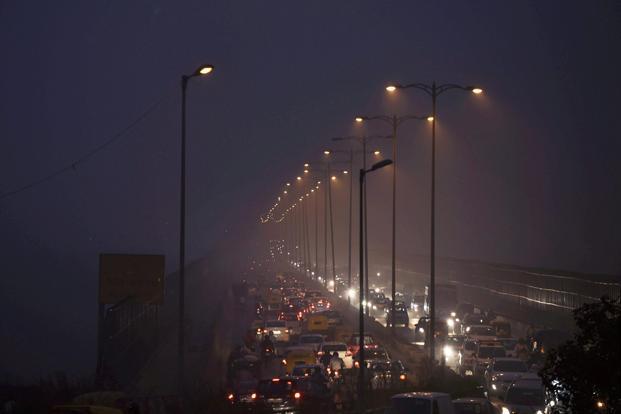Air quality in Delhi fell to a ‘severe’ low, forcing authorities to take stringent actions
 NEW DELHI : Air quality in New Delhi fell to a ‘severe’ low on Tuesday forcing authorities to take stringent actions including closure of primary schools on Wednesday. According to the Central Pollution Control Board (CPCB), the air quality index (AQI) for Delhi was 448 as of 4 p.m. on Tuesday, making it ‘severe’ — the worst category and one that comes with the warning that even healthy people are affected by the toxic air.
NEW DELHI : Air quality in New Delhi fell to a ‘severe’ low on Tuesday forcing authorities to take stringent actions including closure of primary schools on Wednesday. According to the Central Pollution Control Board (CPCB), the air quality index (AQI) for Delhi was 448 as of 4 p.m. on Tuesday, making it ‘severe’ — the worst category and one that comes with the warning that even healthy people are affected by the toxic air.
Delhi, and the national capital region (NCR) centred on it, came under a heavy blanket of smog on Tuesday, with air quality reaching “severe” level. The situation is not expected to change for the next two days.
On Tuesday evening, Delhi’s deputy chief minister Manish Sisodia announced that primary schools in the national capital will remain closed on Wednesday, adding, if needed, it will be extended. He also said the outdoor activities in schools will be stopped.
In a similar situation at the same time last year, multiple courts had passed several orders to control stubble burning in northern states and implementation of a graded response action plan (GRAP) to tackle high levels of pollution. But, so far, authorities have failed in preventing stubble burning in Punjab and Haryana in winters, which intensifies air pollution in the Delhi NCR region.
According to data from the Central Pollution Control Board (CPCB), air quality at the majority of the monitoring stations across Delhi and adjoining towns touched “severe” levels on Tuesday. Overall, the air quality index of Delhi on Tuesday evening was 443 (Severe). Average levels of two deadliest components in air pollution—Particulate Matter (PM) 10 and PM 2.5—across Delhi NCR on Tuesday was 418 µg/m³ (over four times the safe limit) and 439 µg/m³ (over seven times the safe limit) respectively.
The Indian Medical Association asked the Delhi government to stop all outdoor activities and sports in schools. Earlier in the day, Delhi’s chief minister Arvind Kejriwal announced that considering the high levels of pollution, he has asked Delhi’s education minister Manish Sisodia to consider closing schools for a few days. “Every year this happens during this part of year.
The Environment Pollution (Prevention and Control) Authority (EPCA), which is tasked with implementation of GRAP, also met on Tuesday and asked governments of Delhi and adjoining states to take a series of immediate steps to control pollution.
When air quality touches “severe” level, it causes respiratory problems to even healthy people and seriously impacts those with existing diseases. In such conditions, outside exposure and activities, including intense physical activities should be minimised.
EPCA noted that “given the prevailing conditions and the concern about the possible deterioration in weather conditions, it is possible that severe plus or emergency conditions would need to be imposed in the coming days” and directed governments in Delhi NCR to ensure that all agencies are ready to implement tougher measures as laid down in GRAP. EPCA advised schools to stop all outdoor activities and to keep exposure to a minimum and offered a similar advice to “all citizens of Delhi and NCR”.
“Currently, Delhi and its neighbouring region are seeing almost still conditions at the ground level, but in the upper atmosphere there are two wind masses—one from Punjab, which is bringing pollutants from crop burning and the other from eastern Uttar Pradesh, which is bringing moisture.
These are colliding at the higher altitude. This is leading to conditions where there is both moisture and pollution as well as no wind at the ground level,” said Sudhakar while adding that it is expected that conditions will remain severe over the next two days as per the forecast made available by India Meteorological Department (IMD).
EPCA called for long-term actions and said unless that is done, air pollution levels cannot be brought down. It called for drastic actions like stringent monitoring of emissions in industrial estates and as well as from illegal industries, switch-over to gas in vehicles, power plants and industry, massive augmentation of public transport, massive action to change garbage management system and rograms per cubic metre.(With Agency Inputs ).

